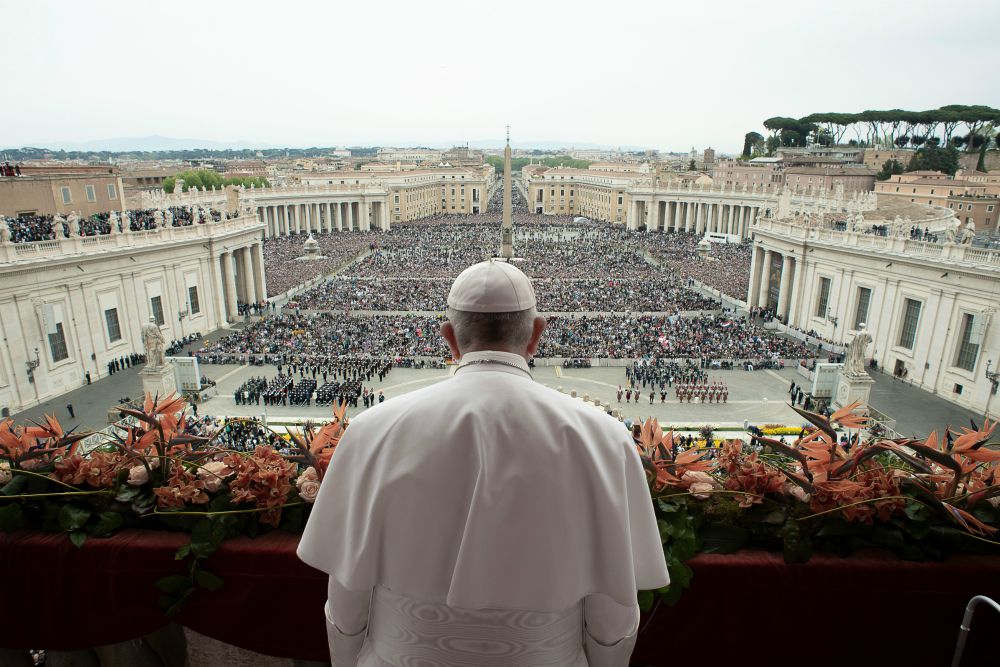
Pope Francis leads his Easter message and blessing "urbi et orbi" (to the city and the world) from the central balcony of St. Peter's Basilica at the Vatican April 21. (CNS/Vatican Media)
Pope Francis, known for kissing the feet of Muslims, warning about the dangers of fossil fuels, and speaking prophetically on the spiritual death of wall building, has earned a reputation as the anti-Trump.
What we've learned about Donald Trump over the past two years is that while the president tends to kick down, whether it's freshman Congresswomen or protesting football players, he has largely left the world's most powerful religious leader unscathed.
Francis may well have a more formidable foe in Steve Bannon, the former Trump campaign aide who recently noted that it was God's work that generated tens of thousands of votes in Wisconsin and Michigan in the 2016 Republican election triumph and has claimed credit for the "alt right," an ill-defined phrase usually associated with Confederate memorial supporters and anti-immigrant internet trolls.
Now Bannon is setting his providential magic on the Vatican, taking a shot at the pope, with the help of wealthy American and European friends. He's even bought a monastery in an Italian village outside Rome, a kind of counter-Vatican, where he is planning seminars in training a new generation of leaders in what he calls populist nationalism. The Italian villagers protesting his plans prefer to call it fascism.
Call it whatever, correspondent Richard Engel of NBC in a report that aired Palm Sunday weekend, reports that Bannon is serious. Engel notes that Bannon and others who are the pope's enemies see him as "a left-wing liberal and they're coming for him."
Bannon, seeking new fields to conquer after being fired by Trump two years ago from his job as a White House adviser, says he has the support of powerful Americans and prominent Catholics, among them Cardinal Raymond Burke. Their rallying cry is the pope's failure to solve the sex abuse crisis which, Bannon says, threatens to bankrupt the church and force it to liquidate its properties. Perhaps it was the editing of Engel's reporting, but Bannon focuses on the property, not on the victims.
Bannon's populist nationalism remains an uneasy concept to fit into a Catholic framework. Ever since Paul convinced Peter that the church should forego mandatory circumcision for converts, emerge from its Judaic cocoon and fully embrace the Gentile world, Catholicism has stood for universalism. The papacy long battled European kings who wanted to control the church for nationalistic ends, and, when Catholics came to the United States, they were often perceived as agents of a hostile foreign state, charges that derailed the 1928 presidential campaign of Al Smith.
Now Bannon has taken up the nationalist mantle against the Pope. Following Trump's lead, he has advised European nationalist parties to continue their anti-immigrant agitation. This stands in marked contrast to Francis.
Engel also points to another part of the Bannon appeal. Francis still enjoys popularity ratings that Trump, for one, could only pray for. But there is a segment among Catholics who have heard Francis about the dangers of unbridled capitalism, echoing earlier popes yet with a greater fervor growing out of his Latino roots. That group doesn't like what it's hearing.
Advertisement
As Engel puts it, Bannon's movement is funded by those "who think the pope is bad for business."
Bannon, while taking that support with its promise of big money, takes the pope's view of Catholic teaching personally.
"This is the problem. … He's constantly putting all the faults of the world on the populist nationalist movement," Bannon told Engel about why he opposes Francis.
While support for Bannon's agenda may be negligible in the pews, the fact that he is claiming the allegiance of a sliver of influential Catholics is appalling. Bishops in particular need to be clear which side they are on: The pope's? Or Bannon's emerging anti-Francis movement? Nothing less than the very survival of a unified Catholic church is at stake.




